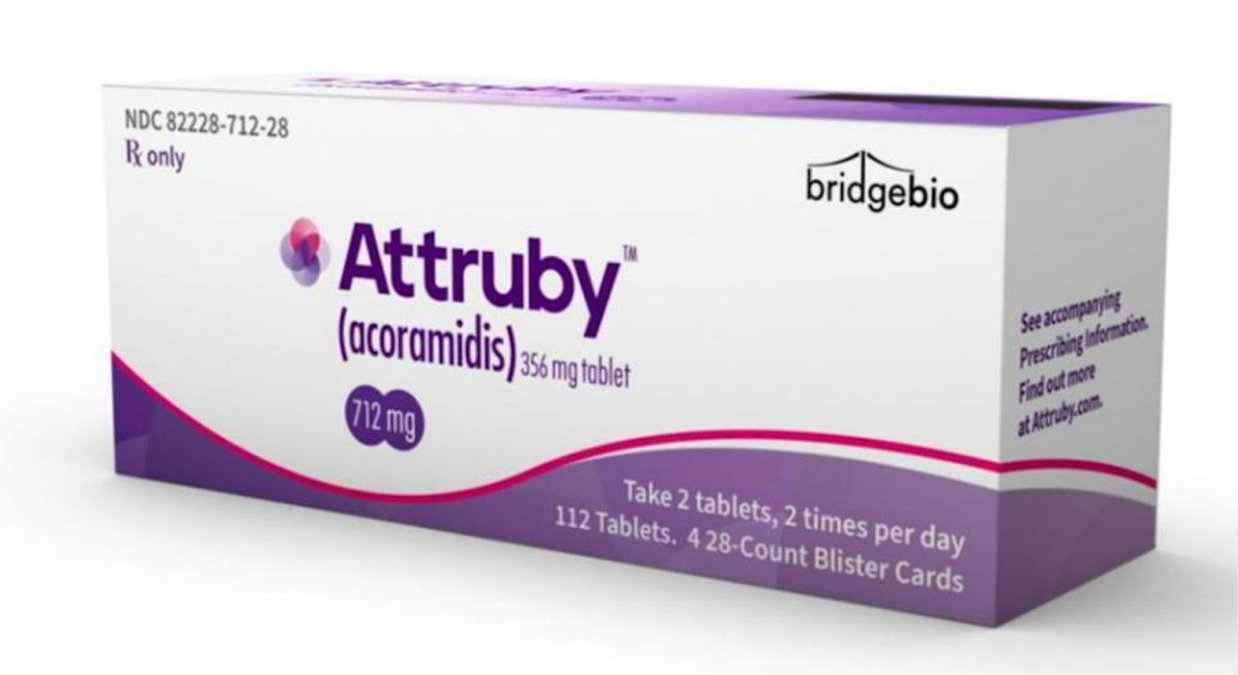Acoramidis Boosts Serum TTR Levels Early And Long-Term, Leading To Better Survival In ATTRibute-CM Study
BridgeBio links acoramidis-driven serum TTR rise to reduced mortality in ATTR-CM patients over 30 months.
Breaking News
May 20, 2025
Simantini Singh Deo

BridgeBio Pharma, Inc., a biopharmaceutical company focused on genetic diseases, recently published data from its Phase 3 ATTRibute-CM trial evaluating acoramidis in patients with transthyretin amyloid cardiomyopathy (ATTR-CM). The findings, published in the Journal of the American College of Cardiology (JACC) Special Focus Issue on Amyloid, showed that an early and sustained increase in serum transthyretin (TTR) levels predicted improved survival outcomes. Acoramidis is a small, orally administered molecule that selectively stabilizes TTR protein by over 90%, preventing it from breaking down and forming harmful amyloid deposits in the heart.
In ATTR-CM, either aging or genetic mutations cause the TTR protein to destabilize and misfold, leading to the buildup of amyloid fibrils in the heart and other organs. The study demonstrated that treatment with acoramidis led to a rapid and sustained increase in stable, tetrameric TTR, which was independently associated with better overall survival, even after accounting for factors like TTR variant type, baseline New York Heart Association (NYHA) functional class, National Amyloidosis Centre (NAC) stage, and initial serum TTR levels. Specifically, acoramidis treatment caused a significant rise in serum TTR levels (averaging 9.1 mg/dL) within 28 days, which was maintained throughout the 30-month treatment period.
For every 5 mg/dL increase in serum TTR, the risk of mortality was reduced by approximately 27% to 32% over 30 months. The early increase in serum TTR was strongly linked to lower all-cause mortality, and this association remained significant even after adjusting for various patient and disease characteristics. Logistic modeling showed that this beneficial rise in TTR was seen only in patients treated with acoramidis, not in those receiving placebo. Furthermore, causal mediation analysis confirmed that the survival benefit of acoramidis was fully mediated by this early and sustained increase in serum TTR levels.
Data from a 42-month open-label extension study reinforced these findings, showing that continuous acoramidis treatment led to significant reductions in both all-cause mortality and cardiovascular-related hospitalizations, including urgent outpatient care for heart failure. The persistent separation of survival and hospitalization curves highlights the importance of early and ongoing treatment to achieve sustained clinical benefits. These results support the idea that greater stabilization of TTR results in better clinical outcomes and emphasize the value of serum TTR as an important prognostic biomarker to guide treatment decisions.
Mathew Maurer, M.D. of Columbia University Irving Medical Center, said in a statement, “Patients with ATTR-CM have progressive amyloid accumulation in the heart, which when untreated manifests as progressive heart failure, arrhythmias, and eventually can result in death. Increases in serum TTR seen with acoramidis therapy within 28 days of initiation and that were sustained with therapy, were associated with a decrease in all-cause mortality independent of baseline risk among subjects in the ATTRibute-CM trial.”
He also added, “The increase in serum TTR is hypothesized to be due to a leftward shift in amyloidogenic TTR to a more stable tetrameric TTR. This is the first concrete evidence that there is a link between this rapid increase in serum TTR and survival. Such data may inform clinical practice, as early and sustained increases in serum TTR could represent a new potential ATTR disease-specific and prognostic biomarker that may further inform clinical decisions in optimizing care for ATTR-CM patients.”
Jonathan Fox, M.D., Ph.D., Chief Medical Officer of BridgeBio Cardiorenal, mentioned, “This landmark analysis adds an incredibly important proof point to acoramidis’s repository of compelling data that higher serum TTR levels are directly correlated with and mediate a reduction in mortality risk. We believe that this will be an important measure for physicians treating ATTR-CM to consider and will be encouraging information for new and existing patients when reviewing options to treat their condition.”
Acoramidis is approved under the brand name Attruby by the U.S. Food and Drug Administration and as BEYONTTRA by the European Commission, Japanese Pharmaceuticals and Medical Devices Agency, and the UK Medicines and Healthcare Products Regulatory Agency. All approvals recognize the drug’s near-complete stabilization of TTR.
